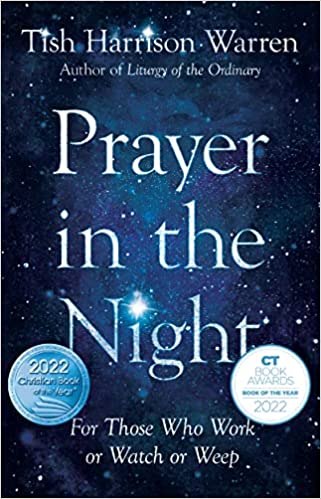This week we return to the Rev. Tish Harrison Warren’s book Prayer in the Night: For Those Who Work or Watch or Weep. Please read chapter 7 “Tend the Sick, Lord Christ: Embodiment.”
The Prayer:
Keep watch, dear Lord, with those who work, or watch, or
weep this night, and give your angels charge over those who
sleep. Tend the sick, Lord Christ; give rest to the weary, bless
the dying, soothe the suffering, pity the afflicted, shield the
joyous; and all for your love’s sake. Amen.
1979 BCP 134
Embodiment:
As we looked at in our study on Adam & the Fall, the Scriptures begin with the understanding that we humans are physical created bodies. On Ash Wednesday, we were reminded that we are created out of the earth. In Hebrew, even the name given to the first person (adam) comes from the word for ground (adamah). Latin (humanus/humus) is the same.
As we looked at in our study of Revelation, the Scriptures end with the promise not that we will escape our embodiment, but that our embodiment will be perfected. Rev. 21:4. And in between the beginning and the end, we have the very embodiment of God in the person of Christ Jesus. John 1. Rev. Warren writes that “pain, pleasure, trauma, and anguish are embodied states. We do not simply have bodies, we are bodies.” p.93. Our bodies are central to who we are.
Well-Bodies:
We were made to be well, to move, to run, to feel the wind on our faces.” p.95. When our bodies are working correctly and free from pain and want, then we believe that all things are possible. Most of us (hopefully) can demonstrate the Fruit of the Spirit – love, joy, peace, patience, kindness, goodness, faithfulness, gentleness, and self-control – when our bodies are working well. It is easy to love God and to love your neighbor when you are well-fed, well-rested, and your body is working well.
Sickness:
Sickness reminds us that we are embodied. And in the breakdown of our bodies, we are reminded of mortality and limitations. With sickness comes humiliation and vulnerability. In sickness, we can no longer do the things that we desire. We not only realize our limitations, but we realize that these limitations are increasing and may never go away.
But sickness is not only a physical issue but spiritual as well. As Rev. Warren points out “our illusions of piety can be undone with one toothache.” p.96. “When our bodies give way, our will do as well.” p.97. If we only have our will to keep our outward spiritual life intact, then sickness will reveal this shortcoming. Her self-reflection should be ours as well – are we truly patient and gentle people, or only patient and gentle people without back pain? Sickness answers that question. How many times do we grow short-tempered as our pain increases?
In Chapter 2 we explored the question of “theodicy” – Why does a good, all-mighty, and all-powerful God permit evil to occur to someone? In our sickness, we encounter an embodied theodicy and a very personal theodicy. In writing about her migraines, Rev. Warren says: “But in the worst season of pain, I have moaned ‘Why, Jesus? Why won’t you take this away.’” Sickness makes the problem of evil personal. The breakdown of our embodied existence causes us to question why and to cry out “tend the sick (tend us), Lord Christ.”
Lenten Resources:
The Episcopal Church offers several Lenten resources this year. (click HERE.) One program is The Way of Love in Lent. These are seven short video sessions that tie the Easter Vigil readings to the seven practices of the Way of Love. Another program (which is more lighthearted) is Lent Madness. This is a fun and engaging way to learn about the men and women comprising the Church’s Calendar of Saints. Each year, 32 saints are placed into a tournament-like single elimination bracket, and voting takes place every weekday.
Questions and Practices:
Rev. Warren’s suggested questions and practices for chapter 7 are:
1. Recall a time when you were really sick. How did your perspective about what is important or necessary change through that experience?
2. How do you experience the reality of vulnerability in your body? Has that affected your spiritual life or your spiritual practices?
3. Does weakness in your body ever act as a memento mori for you? Does it remind you of your death or your limitations?
Dinner is at 6. The menu is ham and bean soup (We are having soup during the entire Lenten season.) Discussion about 6:45. Compline at 8.
Have pity on me, Lord, for I am weak; *
Psalm 6:2-6
heal me, Lord, for my bones are racked.
My spirit shakes with terror; *
how long, O Lord, how long?
Turn, O Lord, and deliver me; *
save me for your mercy’s sake.
For in death no one remembers you; *
and who will give you thanks in the grave?
I grow weary because of my groaning; *
every night I drench my bed and flood my couch with tears.

